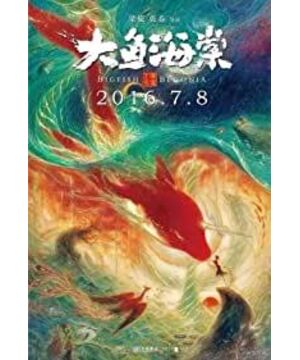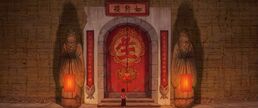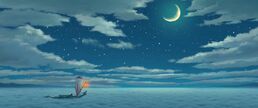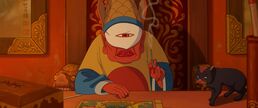The opening of the big fish swimming and the shuttle between the sea and the sky really shocked me. I thought that the plot would be abusive and let Kun's human world and Chun and Qiu's god world have a life-and-death battle, and the atmosphere of chaos and integration of heaven and earth was promoted. To the climax, however, I did not expect that it would have to go through a literary and artistic narrative method, which is not as ups and downs as "The Return of the Great Sage", but it is understandable.
Let's take a look at the development of the whole story.
Logically, the whole story is not too problematic. Tsubaki, who was rescued after being entangled in a net after accepting the coming-of-age ceremony, willing to give half of his life in exchange for the recovery of the youth's soul in order to repay the youth who died for saving himself. In order to save the boy who turned into a big fish and kun, the unknowing Chun used his body to attach his body to the begonia tree that his grandfather turned into after the death of his grandfather, in exchange for the towering growth block. He lived in the hole torn by God and finally saved his home, but Qiu, who had been standing behind to protect Chun, sacrificed himself in order to give Chun a better life.
So here comes the question. What about Kun, whom Tsubaki has been repaying? "There is a fish in Beiming, and it is named Kun. Kun is so big that I don't know how many thousands of miles it is." That is an ancient mythical beast that can spread its wings for thousands of miles, become a fish in the water and a Peng in the sky, but it can face the people of Chun's clan. Killing, God's punishment, but when he was injured, he chose to lie down in the water and let Chun heal him. Perhaps the author, in order to highlight Chun's own heroism or Qiu's tragic color, vividly set Kun, who is instinctively free for thousands of miles, into a trash who only knows how to cry, spreads his wings and can fly but can't protect his friends. He can only die in Chun. When the time comes, give the goddess a few leaves. Kun is no longer the feisty boy he used to be, even though his scar has turned into a more domineering horn. I have to say, this is a bug in the play. There are also scenes throughout the film. Kun and his companions are wandering in the center of the tulou. If Kun is set to lead Kun's companions to resist for the safety of the clan, and for Chun and Qiu to save himself, creating a wonderful battle of the gods of Kun. The battle seems to be more enjoyable and full.
On both sides of Kun, there are Chun and Qiu. I've always wondered why such a name was chosen, but when I saw the incarnations of the two who sacrificed themselves, I suddenly understood - Chun incarnates as a gigantic begonia that grows wildly, and Qiu incarnates as a messy leaf flying in the wind. Perhaps their existence is a symbol of the second season of spring and autumn. Chun's parents are in charge of Haitang Kaixie, grandpa is in charge of Baicao, grandma is in charge of Bainiao, and Qiu's grandma is the head of the clan who calls the world of heaven and earth. The two dress alike and have grown up together since childhood. Sadly, Only after spring can autumn come, and when autumn leaves, can spring arrive. Maybe the two will follow in their footsteps and have the same emotions, but they are destined to miss it. I don't know if the audience has noticed Chun's clothes after being reborn, and the leaves embellished under the right placket also seem to symbolize that Qiu is always guarding her. But don't forget, Kun who became a human and Chun who went to the world, they don't know each other anymore, but at the moment of shaking hands, Chun still wore the little jewelry that Qiu gave him on his neck, um, it's good. , just leave a beautiful thought.
The most miraculous and the most evil are the witch and the rat. In fact, for a moment, I felt that they were lonely, and a little bit of kindness hidden in their psychology broke out. She was sealed in a dark cave. She tried every means to get the token back to the human world. It is conceivable to let the clansmen discover the big fish, let Qiu release the big fish without telling Chun, and finally tell the clansmen about the big fish on the condition of obtaining the token. Where to go, these are the little tricks of the rat woman to break the loneliness and realize her own value; in contrast, the goddess seems to have more symbolic meaning: it looks like a fish, but it appears in a sedan chair carried by a cat. Pets big and small are also cats. The reversed role setting here seems to reflect some kind of complex social phenomenon, while "the color is the six degrees of empty lotus and Haici sailing, and the incense Taiwan Huijing enlightens the three brights." The couplet at the door, coupled with the words of the goddess, "You young people, exchange your life for it." Although the goddess has been asking for and trading, I have to say that the largest "philosophical teaching material" in the whole film appears. In the palace of the goddess, "I've been waiting for you here for a long time", "I'm just a businessman", he skillfully gave his life back to Chun, sold it to Kun for a big favor, and got the whole piece of Qiu I have found myself a solid successor. In the future, whether I am in the human world or the gods, this goddess can be chased and held, so from this point of view, the goddess is the real one. Big winner.
Finally, let's talk about the picture. The lights of the tulou are lit up in circles, and the sky full of stars and moon is so beautiful. The details of the film are really well portrayed, including the characters on each lantern, the small objects in the drawer, and the couplets on the door of the tulou, especially for some fetish objects such as Dijiang and Sanshou, etc., they are still relatively realistic. Looking back, isn't it just paintings that you watch in cartoons? In this sense, "Big Fish and Begonia" is a success.
"Look at the sea and the sky, watch the wind rise and rain, and the hands blow away the vast smoke." May spring come, autumn will come, and begonias will bloom.
View more about Big Fish & Begonia reviews











